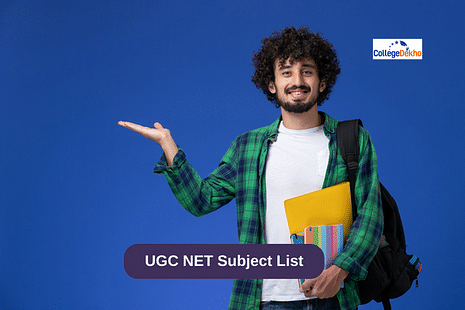
The National Testing Agency (NTA) revealed the UGC NET Subject List for 2024 on its official website. This list contains information about 83 different subjects that candidates can choose from for the UGC NET exam. It also includes details about what each subject covers in its syllabus. This information is crucial for prospective candidates as it helps them make informed decisions while preparing for the forthcoming UGC NET 2024 exam in June which is scheduled from June 10 and June 21, 2024.
In this comprehensive article, you will find a complete UGC NET Subject List, including syllabus details and other important information. This article aims to provide you with all the necessary information to successfully navigate the upcoming UGC NET June 2024.
Also Check:
| Most Important Topics to Score Highest Marks in UGC NET 2024 Paper I | UGC NET Passing Marks 2024 |
|---|---|
| UGC NET 2024 Exam Day Guidelines | UGC NET Important Topics for Law |
How to Choose UGC NET Subject?
According to their post-graduate specialization, candidates must select their UGC NET Subject from the comprehensive UGC NET Subject List. When completing the UGC NET Exam 2024 Application Form, they must select their UGC NET Subject. According to the official UGC NET Notification, candidates may take a relevant UGC NET Topic in the event that their primary subject isn't in the list of UGC NET Subjects. Candidates should keep in mind that they cannot, under any circumstances, change the UGC NET Subjects they selected on the UGC NET Application Form. As a result, candidates must carefully select their UGC NET subject from the entire UGC NET Subject List.UGC NET All Subjects List & Syllabus PDF
In the following table, the candidates will find the UGC NET Subject List with codes of the subjects and respective syllabus PDFs as well. The candidates must read the following table diligently to carefully select the UGC NET Subject from this huge and extensive UGC NET Subject List of 83 subjects along with the syllabus PDF. UGC NET paper 2 exam is subject-specific and based on the subjects chosen by the candidate. Paper 2 comprises 100 questions that hold two marks for each correct answer. The maximum marks in paper 2 are two hundred. Since paper 2 is for specialization, candidates must begin preparing for it as early as their university years. For exam 2, candidates must select the subject they choose to study after graduating. Below is a PDF of the UGC NET Paper 2 syllabus for interested candidates. Click on the PDF links below to check the UGC NET syllabus 2024 for paper 2 for all 83 subjects.UGC NET Subjects | Subject Codes | Syllabus PDF |
|---|---|---|
Adult Education/Continuing Education/Andragogy/Non-Formal Education | 46 | Download here |
Anthropology | 07 | Download here |
Arab Culture and Islamic Studies | 49 | Download here |
Arabic | 29 | Download here |
Archaeology | 67 | Download here |
Assamese | 36 | Download here |
Bengali | 19 | Download here |
Bodo | 94 | Download here |
Buddhist, Jaina, Gandhian and Peace Studies | 60 | Download here |
Chinese | 32 | Download here |
Commerce | 08 | Download here |
Comparative Literature | 72 | Download here |
Comparative Study of Religions | 62 | Download here |
Computer Science and Applications | 87 | Download here |
Criminology | 68 | Download here |
Defence and Strategic Studies | 11 | Download here |
Dogri | 33 | Download here |
Economics/Rural Economics/Co-operation/Demography/Development Planning/Development Studies/Econometrics/Applied Economics/Development Economics/Business Economics | 01 | Download here |
Education | 09 | Download here |
Electronic Science | 88 | Download here |
English | 30 | Download here |
Environmental Sciences | 89 | Download here |
Folk Literature | 71 | Download here |
Forensic Science | 82 | Download here |
French (French Version) | 39 | Download here |
Geography | 80 | Download here |
German | 44 | Download here |
Gujarati | 37 | Download here |
Hindi | 20 | Download here |
| Hindu Studies | 102 | Download here |
History | 06 | Download here |
Home Science | 12 | Download here |
Human Rights and Duties | 92 | Download here |
Indian Culture | 50 | Download here |
Japanese | 45 | Download here |
Kannada | 21 | Download here |
Kashmiri | 84 | Download here |
Konkani | 85 | Download here |
Labour Welfare/Personnel Management/Industrial Relations/Labour and Social Welfare/Human Resource Management | 55 | Download here |
Law | 58 | Download here |
Library and Information Science | 59 | Download here |
Linguistics | 31 | Download here |
Maithili | 18 | Download here |
Malayalam | 22 | Download here |
Management (including Business Admn. Mgt./Marketing/Marketing Mgt./Industrial Relations and Personnel Mgt./ Personnel Mgt./Financial Mgt./Co-operative Management) | 17 | Download here |
Manipuri | 35 | Download here |
Marathi | 38 | Download here |
Mass Communication and Journalism | 63 | Download here |
Museology & Conservation | 66 | Download here |
Music | 16 | Download here |
Nepali | 34 | Download here |
Oriya | 23 | Download here |
Pali | 83 | Download here |
Performing Art - Dance/Drama/Theatre | 65 | Download here |
Persian | 42 | Download here |
Philosophy | 03 | Download here |
Physical Education | 47 | Download here |
Political Science | 02 | Download here |
Politics including International Relations/International Studies including Defence/Strategic Studies, West Asian Studies, South East Asian Studies, African Studies, South Asian Studies, Soviet Studies, American Studies | 90 | Download here |
Population Studies | 15 | Download here |
Prakrit | 91 | Download here |
Psychology | 04 | Download here |
Public Administration | 14 | Download here |
Punjabi | 24 | Download here |
Rajasthani | 43 | Download here |
Russian | 41 | Download here |
Sanskrit | 25 | Download here |
Sanskrit traditional subjects (including Jyotisha/Sidhanta Jyotish/Navya Vyakarna/Vyakarna/Mimansa/Navya Nyaya/Sankhya Yoga/Tulanatmaka Darsan/Shukla Yajurveda/Madhav Vedant/Dharmasasta/Sahitya/Puranotihasa/Agama) | 73 | Download here |
Santali | 95 | Download here |
Sindhi | 101 | Download here |
Social Medicine & Community Health | 82 | Download here |
Social Work | 10 | Download here |
Sociology | 05 | Download here |
Spanish | 40 | Download here |
Tamil | 26 | Download here |
Telugu | 27 | Download here |
Tourism Administration and Management. | 93 | Download here |
Tribal and Regional Language/Literature | 70 | Download here |
Urdu | 28 | Download here |
Visual Art (including Drawing & Painting/Sculpture Graphics/Applied Art/History of Art) | 79 | Download here |
Women Studies | 74 | Download here |
Yoga | 100 | Download here |
Also Read:
| UGC NET 2024 Exam Pattern | UGC NET Question Papers 2024 - Download PDFs |
|---|
UGC NET Syllabus 2024
The University Grants Commission (UGC) has prescribed the syllabus for the UGC NET June 2024 cycle for 83 subjects. The NTA UGC NET syllabus 2024 has been provided by the University for Paper 1 and Paper 2 (83 subjects). The UGC NET syllabus Paper 1 comprises topics from Teaching and Research Aptitude and the Paper 2 syllabus differs for all 83 subjects. Have a look at the detailed UGC NET syllabus below. Understanding the Paper 1 and Paper 2 UGC NET 2024 syllabus is the initial stage in exam preparation. To adequately study for the exam, candidates need to be familiar with the most recent UGC NET exam pattern and syllabus. To ascertain candidates' eligibility for the position of Assistant Professor and/or Junior Research Fellowship (JRF) in Indian universities and colleges, the UGC NET 2024 exam will be administered for 83 disciplines.UGC NET Syllabus 2024: Paper 1
UGC NET Paper 1 syllabus 2024 comprises topics from General Paper on Teaching and Research Aptitude, which is common and mandatory for all candidates. Check the complete UGC NET syllabus for Paper 1 below.Unit-I: Teaching Aptitude
- Teaching: Concept, objectives, levels of teaching (memory, understanding and reflective), characteristics and basic requirements.
- Learner’s characteristics: Characteristics of adolescent and adult learners (academic, social, emotional and cognitive), individual differences
- Factors affecting teaching related to: Teacher, Learner, Support material, Instructional facilities, Learning environment and Institution
- Methods of teaching in higher learning institutions: Teacher-centred vs learner-centred methods; offline vs online methods (Swayam, Swayamprabha, MOOCs, etc.).
- Teaching support system: Traditional, modern and ICT based Evaluation systems: Elements and types of evaluation, evaluation in Choice Based Credit Systems in higher education, computer-based testing, innovations in evaluation systems.
- Meaning, Types, and Characteristics of Positive and Post-Positivistic Research Methods Experimental, descriptive, historical, qualitative, and quantitative research techniques research procedures.
- Writing a thesis and an article Format and referencing fashions.
- The use of ICT in research.
- Research integrity
A passage of text is given. Questions are asked from the passage which need to be answered.
Unit-IV: Communication
- Communication: Meaning, types and characteristics of communication
- Effective communication: Verbal and non-verbal, inter-cultural and group communications, classroom communication
- Barriers to effective communication
- Mass-media and society.
- Reasoning types
- Number series, letter series, codes and relationships Mathematical aptitude (fraction, time & distance, ratio, proportion and percentage, profit and loss, interest and discounting, averages etc.)
- Recognizing the format of arguments: Forms of argumentation, categorical propositions' structures, mood and figure, formal and informal fallacies, language usage, the meanings of words, and the traditional square of opposition assessing and separating deductive and inductive arguments.
- Analogies
- Venn diagram: Simple and multiple use for establishing validity of arguments
- Indian Logic: Means of knowledge
- Pramanas: Pratyaksha (Perception), Anumana (Inference), Upamana (Comparison), Shabda (Verbal testimony), Arthapatti (Implication) and Anupalabddhi (Non-apprehension) Structure and kinds of Anumana (inference), Vyapti (invariable relation), Hetvabhasas (fallacies of inference).
- Sources, acquisition and classification of data
- Quantitative and qualitative data Graphical representation (bar-chart, histograms, pie-chart, table-chart and line-chart) and mapping of data
- Data interpretation Data and governance
- ICT: General abbreviations and terminology
- Basics of Internet, Intranet, E-mail, Audio and Video-conferencing
- Digital initiatives in higher education
- ICT and Governance
- Development and environment: Millennium development and Sustainable development goals Human and environment interaction: Anthropogenic activities and their impacts on the environment
- Environmental issues: Local, regional and global; air pollution, water pollution, soil pollution, noise pollution, waste (solid, liquid, biomedical, hazardous, electronic), climate change and its socio-economic and political dimensions Impacts of pollutants on human health
- Natural and energy resources: Solar, Wind, Soil, Hydro, Geothermal, Biomass, Nuclear and Forests
- Natural hazards and disasters: Mitigation strategies Environmental Protection Act (1986), National Action Plan on Climate Change, International agreements/efforts -Montreal Protocol, Rio Summit, Convention on Biodiversity, Kyoto Protocol, Paris Agreement, International Solar Alliance.
- Institutions of higher learning and education in ancient India
- Evolution of higher learning and research in post-independence India
- Oriental, conventional and non-conventional learning programmes in India
- Professional, technical and skill-based education.
- Value education and environmental education
- Policies, governance, and administration
New UGC NET 2024 Subject
Added for Paper 2 Hindu Studies (Subject Code 102) was a new subject that the UGC introduced to the list of UGC NET 2024 subjects in 2024. The UGC NET Hindu Studies course outline is available below as a PDF download. Candidates who want to select Hindu Studies as a topic can download the comprehensive syllabus right now and begin preparing.Best UGC NET Books for Preparation
Go through the list of important books recommended by toppers for preparation of UGC NET Paper 1 below.
UGC NET Paper 1 Book | Author |
|---|---|
Trueman's UGC NET/SET General Paper I | M Gagan and Sajit Kumar |
NTA UGC NET/SET/JRF Paper I: Teaching and Research Aptitude by Pearson | KVS Madaan |
General Paper-1 UGC NET/JRF/SLET – Teaching & Research Aptitude | Arihant Experts |
Upkar’s UGC-NET/JRF/SET Teaching And Research Aptitude (General Paper - I) | Dr Lal Jain and Dr KC Vashistha |
Students are also advised to keep visiting the official website to get the latest updates on the same.
Related Links
| UGC NET June 2024 Cutoff for Hindi | UGC NET June 2024 Cutoff for English |
|---|---|
| UGC NET June 2024 Cutoff for Commerce | UGC NET June 2024 Cutoff for Political Science |







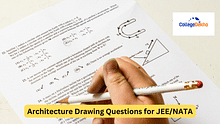
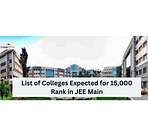

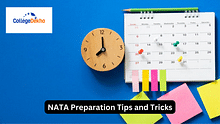
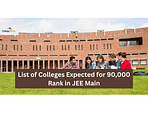





Similar Articles
UP B.Ed JEE 2024 Hindi/ English: List of Important Topics & Weightage
Jharkhand B.Ed Entrance Exam 2024: Admit Card, Exam Date (April 21), Answer Key, Result
Jharkhand B.Ed Entrance Exam 2024 Section-Wise Preparation Tips
Jharkhand B.Ed Entrance Exam 2024 Syllabus and Section-Wise Weightage
How to Prepare for Jharkhand B.Ed Entrance Exam 2024?
NEP 2020: 3-Year vs 4-Year Bachelor’s Degree, 1-Year Master’s Course, Exit Option, Multidisciplinary Education